Tuesday Feb 17, 2026
Tuesday Feb 17, 2026
Thursday, 29 July 2021 00:25 - - {{hitsCtrl.values.hits}}
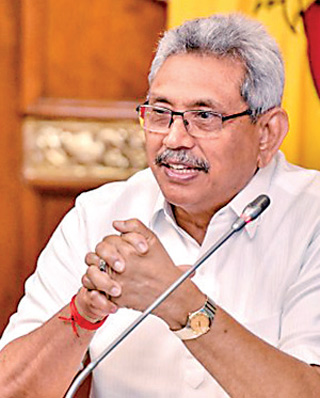
With the fertiliser ban and the KDU issue, the Gotabaya Government has the academics (in the Sciences, not just Arts) and the students, i.e., the island’s entire university community, arrayed against it in an unprecedented manner
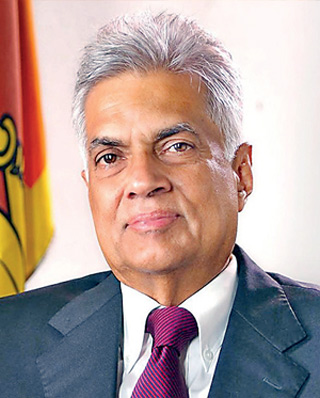
Ranil Wickremesinghe, like Mangala Samaraweera, has called for an ‘alternative policy framework’. Any alternative policy framework has to be an alternative to theirs, because the Ranil-Mangala duo sank Yahapalanaya and the UNP
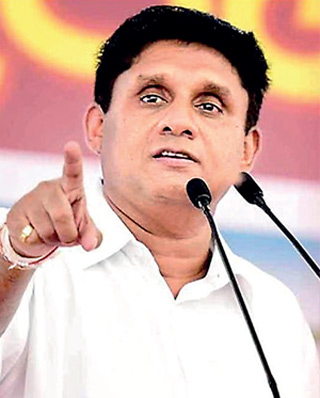
Opposition unity on the basis of scrapping the executive presidency isn’t worth trading-in Sajith’s candidacy. Demonstrating a multiplier-effect among the multitude, he is the game-changer. SP is the Opposition’s decisive asset
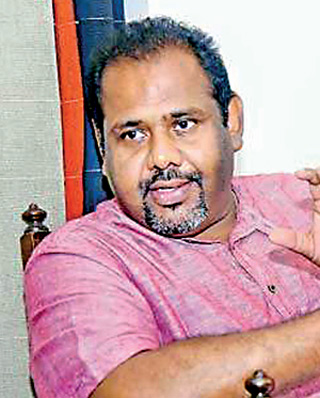
Gajan Ponnambalam must be commended for delivering the best parliamentary speech of the recent No Confidence debate, in which he convincingly pointed to the burden of peacetime defence expenditure as a cause of the economic crisis
 The fall of the tallest tree in the forest of the electronic media, ‘Killi’ Rajamahendran, a civilised, cultivated, courteous, gracious gentleman and undaunted fighter of the old school; an urbane member of the elite who combined universalist culture with concern for the rural underprivileged; one of the two tallest trees (the older being D.R. Wijewardene’s son) in the larger forest of the media in general, unhappily coincides with the Government’s plan to reinforce the Press Council Act, an old guillotine for media freedom dating back six decades.
The fall of the tallest tree in the forest of the electronic media, ‘Killi’ Rajamahendran, a civilised, cultivated, courteous, gracious gentleman and undaunted fighter of the old school; an urbane member of the elite who combined universalist culture with concern for the rural underprivileged; one of the two tallest trees (the older being D.R. Wijewardene’s son) in the larger forest of the media in general, unhappily coincides with the Government’s plan to reinforce the Press Council Act, an old guillotine for media freedom dating back six decades.
‘Killi’ Rajamahendran made a progressive, modernising and democratising transformation in popular culture and consciousness. An unforgettable personality; a great man.
Confrontation course
When the KDU is producing good results as it stands, and the government doesn’t need confrontations at this time, why the polarising KDU bill?
The answer is the military or ex-military mindset. For a civilian democrat, the main matter is getting to your policy objective while managing and balancing contending sociopolitical forces; proceeding in a way that doesn’t jeopardise your re-election. By contrast, for someone with a military mindset, your policy objective is like a military objective, and you have to get there overcoming or by-passing obstacles; prevailing over those who oppose you and therefore are definable as your enemies. Taking your target in the shortest possible time is what motivates: politics and public policy as war or war-game.
The PM or Minister Alahapperuma would confirm to President GR that today’s demonstrations are unprecedented since those of the late 1980s in which they were active participants. This time, Sinhala nationalism is not the propellant; social and economic issues are. This makes the size, ubiquity and frequency of the ongoing protests more impressive.
With the fertiliser ban and the KDU issue, the Gotabaya Government has the academics (in the Sciences, not just Arts) and the students, i.e., the island’s entire university community, arrayed against it in an unprecedented manner. I should know: legendary civil servant Neville Jayaweera recorded in the Sunday Times that my father, Mervyn de Silva, belonging to the inaugural batch at Peradeniya (transitioned from Colombo Uni), led the first ever strike at the Peradeniya university.
During the hostile reception that Presidential confidante Nissanka Senadipathi, the head of Avant-Garde, received from the crowd thronging the Presidential Secretariat precincts, there was a spontaneous attempt to let the air out of one of the tyres of his car. The strong, almost desperate intervention by Mahinda Jayasinghe, the articulate Secretary of the Teachers’ Service Union and JVP member, secured unimpeded passage for Senadipathi. There is mounting anger on the streets but that anger isn’t generated by the JVP or FSP; it’s coming from the grassroots, fuelled by an increasingly untenable socioeconomic situation.
Unarmed protest movements are phenomena that every government must be ready to reach a negotiated settlement with, but the ex-military mindset views any negotiated solution as a bad thing. That is understandable in the case of an implacable, intransigent armed foe, the LTTE, but in peacetime and sociopolitical matters, there are no such enemies—except for residual cells of Islamist-jihadi terrorists.
In my last column I referred to the Chinese policy of ‘Military-Civil Fusion’ (MCF) as possible inspiration for the needless yet planned proliferation of the KDU. Reporting Secretary/Defence Gen. Kamal Gunaratna’s exposition on the KDU legislation, the Ministry of Defence website gives as one of the objectives of that legislation: “The profound setting for the enrichment of future civil-military cooperation”. The report goes on to elaborate that ‘the Vice Chancellor [Gen. Milinda Pieris] stated “This joint atmosphere among students has produced a profound setting for civil-military cooperation enrichment within the society”’. (Ministry of Defence - Sri Lanka – https://www.defence.lk/Article/view_article/3770)
Why is there a need for “the enrichment of future civil-military cooperation” in Sri Lanka? While we must applaud the atmosphere within the KDU (at which I have delivered several lectures during wartime and am privileged to have been gifted plaques from), why do we need “civil-military cooperation enrichment within the society”, and extra legislation for that purpose? Where and what is the deficit “within the society” due to which “enrichment within the society” is sought?
Militarisation’s cost
The questions of the diffusion of militarism and the accelerated pace of militarisation are no longer limited to the issue of democracy. Gajan Ponnambalam must be commended for delivering the best parliamentary speech of the recent No Confidence debate, and one of the most memorable of recent times, in which he convincingly pointed to the burden of peacetime defence expenditure as a cause of the economic crisis.
The KDU “has secured Rs. 36.54 billion from two State banks under a Treasury guarantee” (ST). This will enable it to outspend all other established, normal universities. That, and the recent signing by Sri Lanka’s MoD of a $ 50 million deal with Israeli Avionics Industries to upgrade the Kfirs, come at a time when fields are starved of fertiliser and children have to climb trees to gain access to learning. It is wildly irrational for a government to paint a target on this island by tilting heavily to one side in the big power contest and then try to protect it by spending unaffordable amounts of hard currency on warplanes to provide us protection that they simply cannot, from vastly superior big powers including neighbours.
Any future Sri Lankan government must adopt the policy doctrine which this one will not: the doctrine of security sufficiency. This is most suitable policy for defence in peacetime. While we live in a historical period of heightened big power rivalry, the dangers that arise from it are not those that Sri Lanka, can protect itself from by means of conventional weaponry. As a small state, Sri Lanka must defend its sovereignty as it did during much of the Cold War, namely by the soundness of our foreign policy and the distinction of our diplomacy: our ‘smart power’ (‘Prabuddha Shakthiya’, to use R. Premadasa’s superb coinage decades before Harvard’s Prof. Joe Nye minted ‘smart power’).
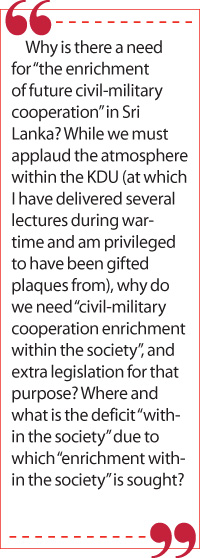 Rectify resistance
Rectify resistance
The stakes involved in the ongoing struggle against the KDU bill are so high that the protest movement cannot rely on resolve, radicalism and romanticism. It must not depend solely on a frontal and linear offensive, but must also plug the gaps in its defences.
The Achilles heel of the radical left which provides the framework for this important struggle, is also the gap through which the project of the militarisation of the universities—starting with the earlier ‘leadership training’—has infiltrated ideologically and socially. That is the failure of the JVP to combat or determinedly denounce and renounce the ugly phenomenon of coercive ragging or ‘hazing’ (as it’s called elsewhere). AKD and the present leadership of the JVP came up through the university students’ movement, so this is a particularly noticeable and reprehensible moral-ethical irresponsibility.
Relatedly, there is the breach in the Movement’s defences kept open by the JVP’s refusal to make a self-criticism about its savagely violent past, and I do not mean the fact of armed uprisings against the state but the character of the violence it deployed against unarmed non-combatants.
The most incisive yet poignant perspective on this deeply-embedded psychological complex of the JVP was by an outstanding radical student leader and orator of my undergraduate years, Indrawansa de Silva, now a professor emeritus in the US. (JVP and the Cost of Lost Revolution – The Island – https://island.lk/jvp-and-the-cost-of-lost-revolution/).
The gaps in the Movement’s defences can be sealed by a clean break by AKD, Kumar Gunaratnam et al., with on-campus student-on-student brutality, and the earlier history of lethal violence against soft (unarmed) targets, e.g., Colombo university student leader Daya Pathirana. The Left can occupy the moral-ethical high-ground.
Opposition’s obstacles
Even if Governmental policy is halted or retreats in the streets in the face of a left-led resistance movement, it can be removed only at the ballot box, as after the Hartal of August 1953, when regime-change took the General Election of 1956 and a moderate, progressive-centrist electoral option.
In Business Today, January-Feb 2000, Sirisena Cooray, once the UNP’s master-organiser and electoral strategist (and close friend of ‘Killi’ Rajamahendran for over a half-century), lamented that under Ranil Wickremesinghe, the UNP would fluctuate around an average of 25% at future parliamentary elections, and disclosed he had put that in a letter to President D.B. Wijetunge. He was prophetic.
If the SJB remains within the UNP space which has shrunk over 25 years, doesn’t think outside the minoritarian-neoliberal UNP policy box, and the formula of pro-Opposition lobbyists remains an arranged re-marriage of the SJB and the moribund UNP, victory will be delayed and distant.
Having exhibited ignorance of the subject in which he held a portfolio by confusing in a recent article, the Bay of Pigs (April 1961) and the Cuban Missile Crisis (October 1962), former Foreign Minister Mangala Samaraweera has proposed that there should be an alternative to—not a substitute for—President GR’s ideology.
He calls for a liberal-democratic program as the alternative. Why only ‘liberal democratic’? Why not progressive-democratic, social-democratic, national-democratic or popular-democratic? In the global South, when rightwing authoritarians have been defeated, e.g., Mexico, Argentina, Bolivia, Peru, where was it by liberal-democratic leaders or liberal-democracy alone, without a strong dose of progressive nationalism and left-populism?
Ranil Wickremesinghe has similarly called for an ‘alternative policy framework’. Any alternative policy framework has to be an alternative to theirs, because the policies (and profile) of the Ranil-Mangala duo sank Yahapalanaya and the UNP, generating the Alt-Right wave which catapulted Gotabaya Rajapaksa and his ex-military ultranationalists to power.
Ranil didn’t get re-elected in Colombo and Mangala ducked contesting in Matara. They now pass strictures on and pontificate to those who contested and won.
Those who survived the tectonic electoral shift constitute the alternative. The alternative program/framework will emerge through the crucible of their experience.
The left-liberal bet on the JVP is also illogical. The JVP failed to make it into double-digits in percentage-terms throughout its electoral history—except once, in 2004, in an SLFP-led coalition.
The first chance to politically defeat the regime would be the referendum over the new Constitution. But the rulers will not depart. The real ending/exit is the Presidential Election 2024.
The Opposition’s main internal obstacle is the fake problem and diversionary slogan of the presidency. Pathological anti-Presidentialists should ponder whether Biden’s progressive programs would have any chance if not for Presidential decrees, and were left solely to the legislature instead, with the Republicans’ rightwing radicalism and obstructionist presence (which may increase after the midterm elections).
Having faced and fought many rightist Presidents—Nixon, Reagan, Bush, Trump—no US Democrat, however progressive, has ever advocated the abolition of the presidency. Nor has the greatest living radical interrogator of US history, Noam Chomsky. AOC has (only) called for the abolition of the Electoral College. America knows that the answer to a bad, even dangerous President is a good presidential candidate, campaign platform, campaign strategy and ground-game.
Despite a history of rife with rightist autocrats, which country in Latin America, Africa and Southeast Asia, has converted from a presidency to the Westminster model? Not even Mandela’s South Africa did so.
Not even at the height of civil war has any Latin American revolutionary movement advocated in its program, the abolition of the executive presidency. Several have produced elected Presidents.
Lacking a two-thirds majority in Parliament, Ranasinghe Premadasa would never have been able to implement his multiple programs of equity and socioeconomic upliftment (Janasaviya, free school uniforms, land redistribution task force, 300 garment factories, etc.) were it not for the engine of the executive presidency.
Hitler was not elected president. The obsession for the abolition of the Presidency is a unique Lankan liberal-democratic neurosis, reeking of nostalgia for colonialism.
Our presidency has to be reformed, stopping midway between the hyper-centralising 20A and the debilitating 19A. 17A was better. Lanka’s presidency should be re-set in line with the USA and France.
SP factor
Lenin observed that “serious politics begins where tens of millions of people are”. Adjusted to Lanka’s population (one-tenth of Russia’s), this would read “where millions of people are”. In the Opposition space only one leader and one party meet that criterion.
Running delayed and hobbled as Presidential candidate in November 2019, Sajith Premadasa scored a higher vote and percentage than did the SLPP (Pohottuwa) in its breakthrough victory in February 2018 under Mahinda Rajapaksa, with Basil as campaign manager. The SLPP obtained a shade over 5 million votes and 40%+ while climbing steeply in Feb 2018. Sajith got over 5 ½ million and 42% while the UNP/Yahapalanaya were in freefall in Nov 2019.
Sajith didn’t “fail to secure” in 2020 the UNP votes that he polled in 2019, as critics allege. Those weren’t UNP votes. The UNP votes were the ones polled in February 2018. The spike from the UNP’s 3.6 million and 29% in 2018, to 5.6 million and 42 % in November 2019 came from Premadasa votes or UNP votes that had long been lost but came back only because of the Premadasa candidacy.
However, those voters didn’t shift from Sajith in November 2019 to the UNP’s successor the SJB in August 2020 when it was no longer a question of voting for Premadasa as President. It was the UNP hardcore base-vote that transferred almost totally to the SJB. Even if every UNP vote accrues to the SJB it’s hopelessly inadequate.
Had Sajith been given the UNP leadership as well as the candidacy as his father was in October 1988, he might have done what his father did in 1988 and pipped the frontrunner to the post. Sajith could at least have run GR much closer. A Sajith-led UNP could have leveraged that performance at the parliamentary election to deprive GR of a two-thirds majority. But Ranil held on to his leadership and his end of the equation with the clan.
Even as things were, Sajith missed the 50% mark by a reasonable 8%.
I can attest that there is no Opposition personality around that the Rajapaksa dynasty is warier of than Sajith Premadasa. This was always so, thus the protracted tilt to Ranil.
Mahinda Rajapaksa saw Ranasinghe Premadasa do the impossible: beat the formidable Sirimavo Bandaranaike.
Mahinda himself lost once or twice to Sajith in Hambantota before Ranil’s CFA with Prabhakaran damned the UNP in the Deep South. Sajith kept on fighting and losing to the Rajapaksas in Hambantota but they knew the only thing holding him down was Ranil’s catastrophic leadership of the UNP. No more.
As the USA shows, politics in a presidential system isn’t about a coalition of political parties, still less of personalities, but about strategising, organising and mobilising a social and geographic coalition which enables the candidate and his/her party to secure a winning majority. Opposition unity on the basis of scrapping the executive presidency isn’t worth trading-in Sajith’s candidacy. Demonstrating a multiplier-effect among the multitude, he is the game-changer. SP is the Opposition’s decisive asset in any electoral endgame.